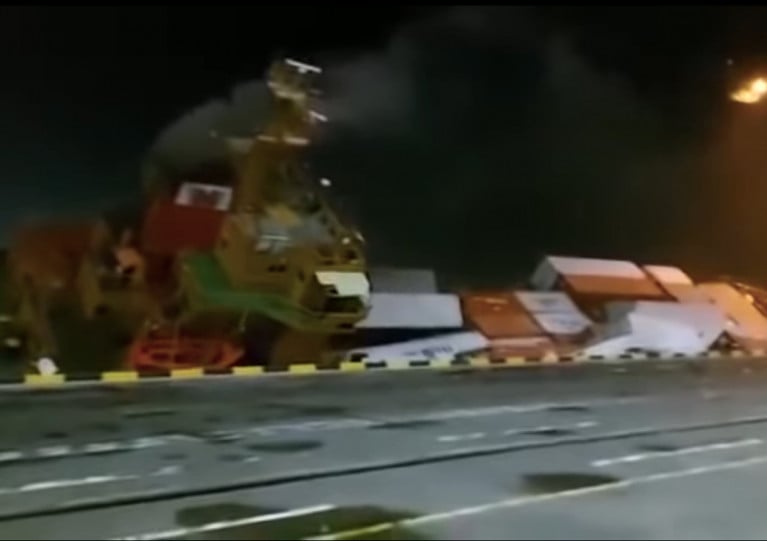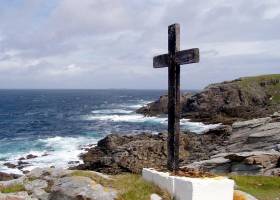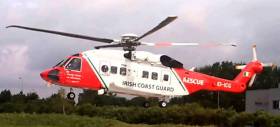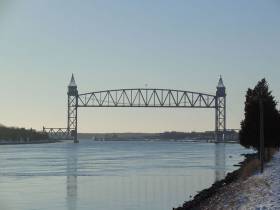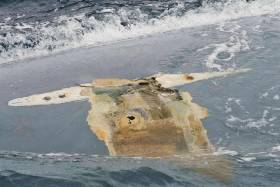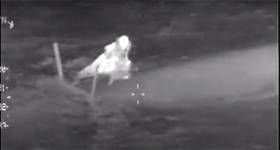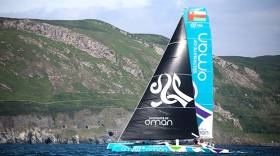Displaying items by tag: capsize
Video Captures Drama of Indonesian Container Ship Capsize
Dramatic footage has emerged of a container ship slowing sinking at a port in Indonesia over the weekend.
The video shows the cargo vessel Mentari Crystal capsizing alongside the pier at Teluk Lamong Terminal in the city of Surabaya — and taking with it its payload of 137 containers.
According to Marine Insight, all crew members were reported to be safe and unharmed by the incident, which is believed to have been caused by faulty ballasting that affected the ship’s stability.
Funds Flow In for Family of Rower Injured in Capsize
#Rowing: Athlunkard Boat Club has set up a gofundme page for their young rower, Amy Mulcahy, and her family. The 12-year-old was involved in a capsize on Saturday in Limerick and had to be cut free as her hair caught in rigging. The gofundme page here has drawn thousands in support, though only set up for a single day. Amy has been in a serious condition in Temple Street Hospital in Dublin.
#MalinHead - The local man who died after a boat capsize off Malin Head in Donegal on Tuesday afternoon (17 July) lost his father in the same area four decades ago, it has emerged.
According to the Irish Independent, Gerry ‘Malin’ Doherty drowned close to where his father Paddy ‘Malin’ Doherty perished after slipping into the water from rocks in 1979.
Gerry Doherty and 16-year-old Thomas Weir died on Tuesday after Doherty’s 16ft cabin cruiser lost power and capsized less than 1,000 metres from shore.
Rescuers recovered a third individual in his late 40s — Dessie Keenan, a relative of Weir — who has since been released from hospital.
The Irish Independent has much more on the story HERE.
Two Dead After Fishing Boat Capsize Off Donegal
#Donegal - A man in his 60s and a teenage boy have died after the fishing boat they were on capsized off Malin Head in Donegal yesterday afternoon (Tuesday 17 July).
As Independent.ie reports, it’s believed the vessel got into difficulty just minutes after setting off from Malin Pier, with three on board, around midday.
Tourists staying locally raised the alarm around 4pm after hearing cries for help, and a major search and rescue operation was launched immediately.
The teenager and a man in his 50s — both believed to be from Derry — were swiftly recovered, though the 16-year-old boy later died in hospital. The man in his 50s was also hospitalised and was said to be in a stable condition last night.
The body of the third person, a man in his 60s, was recovered on the shoreline before 6pm. He has been named locally as Gerry Doherty of nearby Carndonagh.
Independent.ie has more on the story HERE.
Browne 'Bloodied but Unbowed' after Capsize
#Rowing: Damian Browne twice capsized and suffered facial injuries but has continued to row in the Atlantic Challenge race. The Galway man, who competes as Gullivers Travels, posted a remarkable video on his Facebook page below telling of how he had been woken by his face “getting smashed off the side of the cabin”. He made light of the cut, which bled profusely, and the other injuries. The hours following brought another capsize and sighting of a whale which circled his boat and made eye contact with him. Browne and the two other boats from Ireland in the race, Relentless and Home to Portrush, are two weeks into the race from the Canary Islands to Antigua.
Probe Into Irish Boy’s Death In US Boat Capsize
RTÉ News reports that an investigation has begun into the death of an Irish boy in a boating incident in the United States last week.
Harry O’Connor, 8, died on Saturday (29 July) three days after he was involved in a boat capsize in the Cape Cod Canal near Boston.
According to TheJournal.ie, the boy — who was on a day trip with his parents — was trapped under the capsized vessel for more than 20 minutes.
O’Connor had moved to Boston with his family from Clonmel and also had ties to Duleek in Co Meath, where his funeral will take place this Thursday (3 August).
In other news, a post-mortem was set to take place yesterday (Monday 31 July) after a 57-year-old man died in a diving accident off Donegal last Friday (28 July)
John Alwright’s oxygen mask was dislodged after he was swept into a cave by an underwater current, as Independent.ie reportss Independent.ie reports.
Despite the best efforts of his diving companions, Alwright was unresponsive when he came to the surface.
Manslaughter Charges For Yachting Boss Over ‘Cheeki Rafiki’ Deaths
#CheekiRafiki - The director of a yachting company has been charged with manslaughter after the loss of four British sailors when their vessel capsized in the Atlantic two years ago.
As Sky News reports, Douglas Innes of Stormforce Coaching Ltd faces four counts over the deaths of James Male, Andrew Bridge, Steve Warren and Paul Goslin when the Cheeki Rafiki lost its keel some 700 miles off Nova Scotia in May 2014.
The four experiences offshore sailors had been returning to Britain from a regatta in Antigua when the tragedy occurred, as previously reported on Afloat.ie. None of the four were recovered.
Now the UK’s Crown Prosecution Service has brought charges against Innes, head of the company responsible for maintaining the 40ft yacht, following an extensive investigation into the incident by the Maritime and Coastguard Agency.
The Marine Accident Investigation Branch report is available online, and Sky News has more on the story HERE.
For many Afloat.ie readers, he was just a silhouetted figure sitting atop a boat waiting to be rescued when Afloat.ie published the story about a solo sailor's rescue off the Wexford coast. Like so many rescue video clips, there was little detail on what had caused the boat to capsize but French skipper Jean Conchaudron's subsequent thank you comment on Afloat.ie to the Irish rescue services shed a lot more light on his remarkable rescue from the Irish Sea.
Conchaudron was voyaging from Newlin, Cornwall to Dublin. His goal was to meet a friend who was coming to Dublin from Iceland. After a few days holidaying in Dublin they would come back with the two boats to Brittany (Perros Guirec).
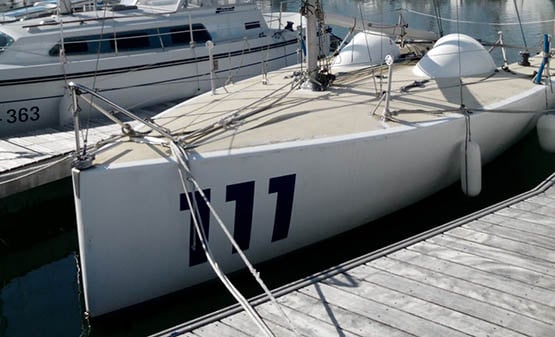 Jean Conchaudron's Mini 6.50 in happier times
Jean Conchaudron's Mini 6.50 in happier times
But as we now know, none of this ever happened. As a result of 'mechanical failure' Conchaudron's keel fell off and he was capsized in seconds.
'Conditions were quite good, I was on deck, wind was about 15 knots, some swell. The boat capsized in about five seconds'.
'I had my PLB in my trousers, and my life jacket on. I triggered the PLB I have in my pocket. It then took to me about half an hour to be able to make a web of ropes to climb on to the hull, I was pushed up and down by the waves, and it took me a while to secure myself with the rope (the web of rope can be seen on the video). It was not possible to start my boat beacon because it was in the cabin and not accessible.
'I then waited to be rescued. The Rescue 117 Helicopter from Waterford saved me and I spent four days in Waterford Regional Hospital due to hypothermia. Thanks to the Irish recsue services, these guys are heroes'.
Conchaudron says he loves Mini 6.50 type sailing and prefers sailing alone. Despite what happened off Wexford, he believes his boat is 'very safe' and well equipped, as are all the boats of this class with a radio beacon and other safety measures. He participated in the "Mini Transat" in 1987, and other races in France.
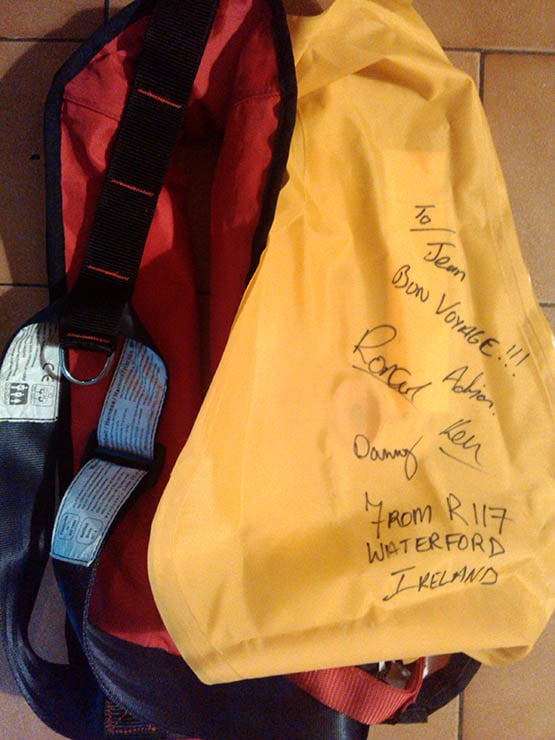 Jean Conchaudron's all important lifejacket signed by his rescuers
Jean Conchaudron's all important lifejacket signed by his rescuers
As far as he knows, the boat is still adrift in the Irish Sea. Conchaudron says the Coastguard is 'keeping an eye on it.' It is his intention to try to get it back, depending on what his insurers say.
'I hope this experience will help other sailors', he wrote on the Rescue 117 Facebook page.
Conchaudron says he has learned an important lesson from the experience and wants to pass it on to other sailors in the hope that it can save other lives at sea: 'Have a PLB in your trousers's pocket, wear your life–jacket, stay afloat, don't sleep and be a warrior to survive'.
Following the capsize of Musandam-Oman Sail early Sunday morning, the five sailors have been safely transferred to a cargo ship and are in transit back to Canada.
The capsize happened in the early hours of Sunday approximately 450 nautical miles east of St Pierre and Miquelon while racing the Transat Quebec-St Malo.
The team is currently assessing solutions for recovering the MOD70.
Round Ireland Record Breaking Multihull Capsizes off Canada
In the early hours of Sunday morning, Musandam-Oman Sail capsized approximately 450 nautical miles east of St Pierre and Miquelon, off the coast of Canada, while racing the Transat Quebec-St Malo. All five crew, including County Kerry's Damian Foxall are reported to be safe and secure.
The Transat Quebec-St Malo race committee and Oman Sail’s immediate priority is to evacuate the crew and bring them ashore safely, and this operation is well underway.
Oman Sail shore crew received a call this morning at 0305 UTC on Sunday 17 July from the boat.
As Afloat.ie reported five days ago, fresh from setting a stunning new Round Ireland record in June, Foxall and his Musandam-Oman Sail team had set their sights on another milestone record in the Transat Quebec-St Malo (TQSM) with a match against the world’s largest trimaran Spindrift 2 expected to push them to the limit.
Updates as more information is received.



























